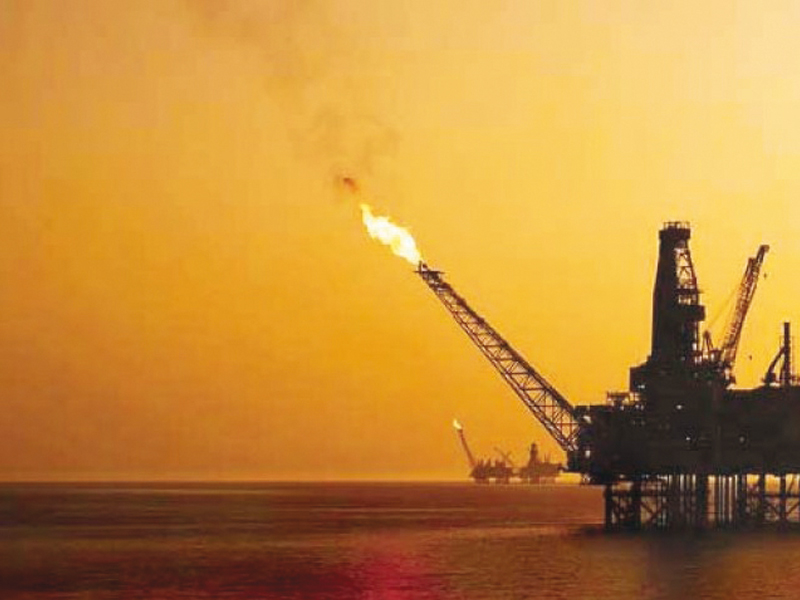
In October 2009 Andrew Gould, then CEO of Schlumberger − the world’s largest oilfield service provider − was on a conference call with analysts. He was discussing regulatory concerns surrounding fracturing — a gas drilling process which helps bring out hydrocarbons from difficult shale formations.
He talked about how it was no coincidence that the United States (US) witnessed a shale revolution as there were expertise and infrastructure, especially a vast service industry, already in place. And then, of all the countries, he mentioned Pakistan.
“Pakistan has a huge amount of shale gas,” he said, according to Reuters. “But, you know, there is no infrastructure in Pakistan to exploit it today.”
Nothing has happened in the four years since then. As a matter of fact, Pakistan’s energy crisis is worse than ever. Demand for natural gas, which remains the mainstay of the economy, far outstrips supply.

In some cities, shortages leave garment factories without gas for five days at a stretch. Winters are the worst. Even in Karachi, which remained largely immune, piped supply to households in some neighbourhoods has tapered off. The economy is battered by high electricity tariff because relatively cheaper gas is unavailable for power plants.
Instead of solving the problem, policymakers have become stuck in endless debate. Take Engro’s $1 billion fertiliser plant, which has been shut more days than not since starting production in 2011, as they discussed if limited gas be used for urea or electricity or stoves?
The discovery of shale changed the energy outlook in the US which had been a net energy importer. But experts now believe that Washington is a few years away from an energy surplus.

In recent months, China has enhanced efforts to exploit its own shale reserves. Most of the petroleum giants like ExxonMobil have set up offices there for the purpose.
But what about Pakistan, a country specifically pointed out by a Schlumberger CEO? Unfortunately, whatever little work that was done didn’t produce results.
Where officials should have rushed to coordinate with industry to exploit the reserves, they have been caught up with corruption enquiries, the rental power scam and futile attempts to import gas.
State-run Pakistan Petroleum Limited, which – along with a multinational company – did some work on a field, has also gone back to focusing on conventional reserves. Security concerns in Balochistan and the circular debt crisis leaves little time for executives to focus on anything else in any case.

It is also interesting that Pakistan, which is the largest producer of guar after India, has been left behind in the race for shale reserves. Guar or cluster bean has emerged as a key ingredient used by drilling companies to crack open shale formations to release hydrocarbons.
Last year, the US Energy Information Administration’s (EIA) placed Pakistan at ninth place when it comes to shale oil reserves.
The report indicates that Pakistan has ‘technically’ recoverable reserves of 105 trillion cubic feet (TCF) of gas and 9.1 billion barrels of oil, enough to feed Islamabad’s energy needs from domestic resources for the next half a century.
Some industry officials were skeptical about the numbers as the EIA projection was based on scanty data from an article published in 1986.
The scepticism is not out of place. Pakistan remains one of the unlucky countries that have yet to carry out a survey to determine recoverable petroleum reserves. A national database of potential reserves helps attract foreign investment.
This is not the only front where policymakers have failed.
Soon after coming to power last year, the new government moved to solve the dilapidating power crisis by releasing Rs500 billion to companies stuck in circular debt. But along with that, came a condition. Some of the oil-fired power plants were to switch to coal.
It has been over six months since that decision was taken. Firms like Karachi Electric Supply Company and Hub Power Company have started work on their part but the government has yet to come out with policy guidelines in this regard. How long will it take for this to materialise is anyone’s guess.
Published in The Express Tribune, January 20th, 2014.
Like Business on Facebook, follow @TribuneBiz on Twitter to stay informed and join in the conversation.
COMMENTS (14)
Comments are moderated and generally will be posted if they are on-topic and not abusive.
For more information, please see our Comments FAQ


1732519298-0/BeFunky-collage-(85)1732519298-0-165x106.webp)
1732611352-0/lamar-(5)1732611352-0-165x106.webp)
1732610018-0/BeFunky-collage-(91)1732610018-0-165x106.webp)












@Asma Raja: contact me please: saad.hasan@tribune.com.pk
Pakistan is full of hot air, but going nowhere.
The LNG import-deal is the main hurdle not the infrastructure. The Ministry of Petroleum and Natural Resources, through a hurriedly drafted final summary of the Economic Coordination Committee of the cabinet, had managed to benefit a particular business group. The ECC secretly approved a summary of the import of LNG from Qatar by using Engro’s existing terminal at Port Qasim. The LNG will be procured from Conoco Phillips (CP), and not from Qatar on a government-to-government basis, as is being falsely claimed. The so-called government-to-government deal with Qatar will be through the CP, a private US energy company. Ms Sughra Imam 2nd wife of Minister Shahid Khaqan had met with Ryan Lance, Chairman and CEO of Conoco Phillips (CP) thrice at Doha to finalize the deal. Ms Janet Kelly Legal consultant of CP had drafted the flawed agreement for Ministry of Petroleum on 23 June 2013. According to Sale agreement the cost of LNG from CP will be cost $17.79/mmbtu (million British thermal unit) plus additional cost of about $1.95/mmbtu to be paid to Engro, resulting in a re-gasified LNG cost of $19.74/mmbtu compared to the open market price of $12.8//mmbtu. This is clearly a mega scam to rob the people of Pakistan by about $1.2 Billion annually. Initially Mr. Khaqan was NOT in favour, but he was forced to advocate this deal in the media. Guess Who is the partner of this mega Scam? Please check the list of partners of Conoco Phillips (CP). Great that Express tribune has raised the otherwise the gas crisis turned into opportunity through Sughra Imam… this all narrated by patriotic and honest bureaucrat on anonymity. Again in Pakistan a systematic, rampant corruption all this and to our helplessness. This seems to be our fate. Asma Raja LLM (UK)
@coal:
The vast majority of Thar Coal is underwater and can only be accessed through coal gasification a technology which is still in the experimental stage. The portion of Thar coal that is accessible with conventional mining techniques is low qualify where the BTU content of the coal is almost equal to the energy used to transport the coal - this requires building power a generation facility at the mine and installing transmission lines to the end users. In short - with today.s technology Thar Coal isn't going to make a significant dent in Pakistan's energy problem.
@Asad Khan: Pak is blessed, She just needs few self less souls to achieve self reliance, (Inshallah)
We(Indian) would like to join the effort to exploit Pakistani Shale and the Hydrates you were mentioning off.We can work together to supply our energy starved market with more energy, so that development can take place in Banglaore, Mumbai, Kolkata and later in Peshawar.Pay will be good.
@ Coal. Oracle coalfields and Engro have signed MOU's with Major Chinese players.
@ vinsin, exactly, Reliance also found the gas deposits offshore too @ KG basin. No Pak company has that kind of vision, i dont blame them though. With all the instability in Pak, and massively insincere politicians
@vinsin: Yes what you've said is very true. The Chinese have also invested heavily in mergers and buy outs to acquire shale technology. This intellectual capital is jealously guarded by western oil companies.
PS: My last comment on this matter was censored. Let's see whether this one gets through.
Forget talk about Shale. What happened to all that Thar coal? Fracking is a relatively new technology meaning all the experts are in demand and probably charge an arm and a leg for their time. Also the technology is jealously guarded by western oil companies. But coal power has been around for ages. Why can't we get that up and running?
Not only shale gas but Pak is also blessed with Gas Hydrates, the formation of an Island after a devastating Awaran Earthquake speaks for itself.
Luckily, Institute of Oceanography is starting a survey to ascertain the exact amount of Gas Hydrates reserves with Chinese help & technology.
Pak is blessed, She just needs few self less souls to achieve self reliance, (Inshallah)
regards,
This is a perfect example of bad journalism. Some of the things that is not mentioned here related to Shale Gas :
1) It requires huge water resources and water treatment plants. Pakistan and India being a water stressed countries going for Shale gas would be disastrous. India has already abandoned the plan for it. It is only feasible for Pakistan in case of population less than 7-8 crores. For India, less than 55 crores.
2) Both US companies and government has refused transfer of technology.
3) Reliance Industries has invested more than a $1 Billion in US Shale gas companies to get to know how. I may be wrong but I think no Pakistani Company has so much capital to invest in just merely getting know-how.
4) The whole process is very expensive and has till now proven to be commercially viable in US.
5) It contaminates underground water with methane or make it unfit for consumption. Again something not advisable for water stressed countries.
why have you got an offshore rig in the picture? Pak has no proven offshore reserves of hydrocarbons, never mind anything else. As for fracking, the problem for Pak is, its a water stressed country as it is.
ET has blocked every single one of my comments for the past 2 weeks. Let this one through.